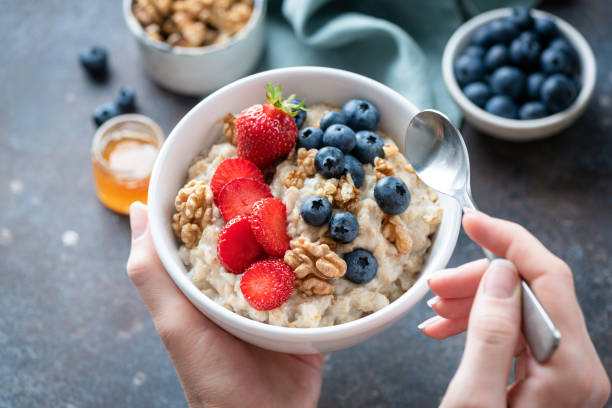Superfoods have been the subject of much attention in recent years, hailed as nutrient-packed powerhouses that offer a plethora of health benefits. While the term “superfood” has no official definition, it generally refers to foods that are exceptionally high in vitamins, minerals, antioxidants, and other nutrients.
Understanding Superfoods
Superfoods are typically nutrient-dense foods that are rich in vitamins, minerals, antioxidants, and other health-promoting compounds. They are often associated with various health benefits, ranging from boosting immunity to reducing the risk of chronic diseases. Some well-known superfoods include:
- Berries: Blueberries, strawberries, and acai berries are packed with antioxidants, which help protect cells from damage caused by free radicals.
- Leafy Greens: Spinach, kale, and Swiss chard are loaded with vitamins, minerals, and fiber that support overall health.
- Nuts and Seeds: Almonds, walnuts, and chia seeds provide essential healthy fats, protein, and fiber.
- Fatty Fish: Salmon, mackerel, and sardines are excellent sources of omega-3 fatty acids, which are beneficial for heart and brain health.
- Legumes: Lentils, chickpeas, and black beans are high in protein and fiber, making them ideal for maintaining a healthy weight and stabilizing blood sugar levels.
- Quinoa: Quinoa is a complete protein source, rich in vitamins and minerals, making it a staple in many healthy diets.
- Turmeric: This spice contains curcumin, a powerful anti-inflammatory and antioxidant compound.
- Green Tea: Green tea is loaded with antioxidants known as catechins, which are associated with various health benefits.
- Yogurt: Greek yogurt is an excellent source of probiotics, which promote a healthy gut.
The Benefits of Superfoods
Superfoods are not just a trendy diet fad; they offer a wide range of health benefits. Some of the key advantages of including superfoods in your diet include:
- Nutrient Density: Superfoods are densely packed with essential vitamins and minerals, providing the body with the nutrients it needs to function optimally.
- Antioxidant Protection: Many superfoods are rich in antioxidants, which help combat free radicals and reduce oxidative stress, potentially lowering the risk of chronic diseases.
- Heart Health: Some superfoods, like fatty fish, nuts, and berries, have been associated with improved heart health by reducing inflammation and supporting cardiovascular function.
- Weight Management: Superfoods high in fiber and protein, such as legumes, quinoa, and leafy greens, promote satiety and can help with weight management.
- Cognitive Function: Omega-3 fatty acids in fatty fish, along with antioxidants in berries and leafy greens, may contribute to better cognitive function and reduced risk of cognitive decline.
- Digestive Health: Superfoods like yogurt with probiotics and high-fiber options support gut health and aid in digestion.
- Reduced Inflammation: Foods like turmeric and green tea have anti-inflammatory properties, which may help reduce the risk of chronic inflammatory conditions.
Incorporating Superfoods Into Your Diet
The concept of superfoods is enticing, but it’s essential to remember that no single food can provide all the nutrients your body needs. A balanced diet that includes a variety of nutrient-dense foods is the key to good health. Here’s how to incorporate superfoods into your diet:
1. Start Slowly
If you’re new to superfoods, it’s a good idea to start slowly. Experiment with one or two superfoods at a time to see how they fit into your diet and how you enjoy them. For example, try adding a handful of berries to your morning cereal or yogurt.
2. Mix and Match
Superfoods work well together, so don’t limit yourself to just one. Create balanced meals that combine different superfoods to maximize their benefits. For instance, prepare a salad with leafy greens, nuts, seeds, and colorful vegetables.
3. Snack Wisely
Superfoods can make excellent snacks. Keep a stock of mixed nuts, dried berries, or small portions of dark chocolate (known for its antioxidant content) for quick, healthy snacks.
4. Smoothies and Juices
Superfoods can be easily added to smoothies and juices. Consider blending spinach, kale, or chia seeds into your morning smoothie for a nutrient boost.
5. Meal Prepping
Prepare your meals in advance and include superfoods in your recipes. Cook quinoa to use in salads, stews, or as a side dish throughout the week.
Dress Up Your Dishes
Enhance the flavor and nutrition of your meals by incorporating superfoods into your cooking. Add turmeric to soups, chia seeds to oatmeal, or ground flaxseeds to your favorite recipes.
Replace Unhealthy Options
Consider replacing less nutritious options with superfoods. For instance, opt for whole-grain quinoa instead of white rice or sweet potatoes instead of regular potatoes.
Be Mindful of Portion Sizes
While superfoods offer many benefits, portion control is essential. Even healthy foods can lead to excess calorie intake if consumed in large amounts. Be mindful of your portion sizes and aim for a balanced diet.
Busting the Superfood Myth
It’s important to recognize that the term “superfood” can sometimes create unrealistic expectations. While superfoods are packed with nutrients, no single food can provide all the essential nutrients your body needs. Instead, the key to a healthy diet is variety and balance. A diet rich in a wide range of fruits, vegetables, whole grains, lean proteins, and healthy fats is the foundation of good health.
Additionally, the impact of superfoods on health can vary from person to person. What works well for one individual may not yield the same results for another. Genetics, lifestyle, and overall dietary patterns play a significant role in how superfoods affect health.
Superfoods can be a valuable addition to a balanced and nutritious diet. They offer a wide range of health benefits, from reducing the risk of chronic diseases to supporting overall well-being. However, it’s crucial to view superfoods as part of a broader dietary strategy that includes a variety of nutrient-dense foods. A healthy diet is not about a single magic food but about the overall quality of your eating habits.
